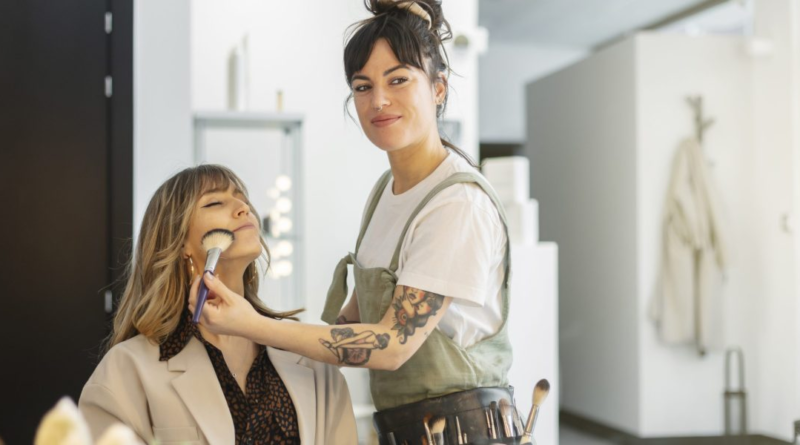These incarcerated women are leaving prison with a certified license to make people feel beautiful. The program ‘gave me a chance to feel human again’
Stephanie F., who asked Fortune to withhold her last name for privacy concerns, was 39 when she became incarcerated in 2018 at Coffee Creek Correctional Facility, a medium-security women’s prison in Oregon that holds anyone from drug charges to those serving life sentences without parole. At the time, she said, “I never really took care of myself,” and needed to learn to “control my temper and keep my mouth shut.”
Five years into her sentence, she was desperate for a fresh start. Her release date in 2032 was a decade away, and prison could be demoralizing. That’s when she met another woman in custody who was enrolled in a cosmetology program at Coffee Creek, which awards graduates a state license in hair, esthetics and nails to practice as estheticians and cosmetologists upon release. It changed everything for her.
“I saw this transformation that this person made and who they became,” she told Fortune in a phone interview, “and I just thought, I want that for my life. I want to be a better person.”
Now age 45, Stephanie is 11 months deep in the two-year program, and is on her way to join a cohort of 36 graduates, nine of whom have been released. The corrections facility has been in partnership with skin therapy company Dermalogica on the program since 2019, with an aim to help women run their own businesses or secure a liveable income upon release. When she’s out, she’ll join the flock of about 650,000 people released from state and federal prisons every year—some of whom find freedom with “little more than a few dollars and a bus ticket,” according to a statement President Joe Biden released while proclaiming April as “Second Chance Month.”
Historically, Americans with criminal records face an unwelcoming labor market. According to a report from the Bureau of Justice Statistics that tracked 50,000 people after leaving prisons in 2010, over a third found no employment four years after their release, and at any given time, no more than 40% were employed. But the tides are turning: in a survey of 1,000 job seekers conducted by Indeed, 92% said they would be comfortable with a co-worker who has a nonviolent criminal record. Companies, like Dermalogica, are committing more to equity efforts, too. In 2022, railroad company Union Pacific began hiring formerly incarcerated people, citing evidence that employment helps them avoid further arrests and makes their children less likely to be imprisoned.
For formerly incarcerated people, re-entry into society is one of the “most significant challenges facing the criminal justice system,” according to a National Institute of Justice report. And with 78,000 women being released from prison each year, while the number of women entering prisons and jails is growing, it’s a problem that deserves attention.
In addition to employment, the report states, challenges include securing housing and managing mental illness, family reunification, childcare and parenting. In fact, the majority of incarcerated women are parents to children under the age of 18.
For Dermalogica’s partnership with Coffee Creek, the intention is to help women come out of prison with a few of those bases covered, namely the ability to earn a livable wage and provide support to their families. The partnership involves a 1,835-hour certification program in hair, skin and nails to cohorts of 20 women at a time.
The structure of the program involves two instructors from Dermalogica staff, which the prison hires on contract to teach monthly classes via Zoom while the women in custody practice techniques on each other and mannequins. They also study theory through textbooks and workbooks that the company provides. Dermalogica doesn’t release how much funding goes into the program, but provides upwards of 50 products like facial cleansers, exfoliators, moisturizers, brushes and LED machines for advanced skin care treatment twice a year, along with study materials for the license certification exams at the end of the program.
In class, the women study how to treat different skin conditions, while also performing hands-on treatments. When a student completes 1,835 hours, another can begin on a rolling basis. The aim is to give women in custody a skillset they can rely on once they’re released—and that they can apply in a growing industry.
The professional skin care industry is growing at an accelerated rate, Dermalogica CEO Aurelian Lis told Fortune, adding that the program “works all around to train students for roles that will be more in-demand than ever.”
Sure enough, the industry is growing: the professional skin care market size was valued at about $12.4 billion in 2022, and it’s forecast to grow to $15.3 billion by 2029, according to a Market Reports World report on LinkedIn. The Bureau of Labor Statistics also expects skin care specialists to grow 9% from 2022 to 2032, a rate that’s much faster than the average for other occupations. But the classes, which also cover entrepreneurship and soft skills, have been offering much more than just a good job outlook.
Lis described how the program is unique to a correctional facility because “it’s the only place that adults in custody are able to touch each other.” With the no-touching rule, “you lose that humanity,” she added, and it’s something many of the women struggle with. Stephanie agreed, noting she believes it’s normal human behavior to want to hug your friends and that physical touch can improve mental health.
Sarah E., a graduate of the program who spent five years in the facility until her release in February 2020, told Fortune that without the support and friendships she formed in class, she “might not be alive today,” adding that the program “gave me a chance to feel human again.”
“Sometimes our families just can’t support us in that place,” she said. “They’re living life outside, and we’re stuck in this box. We’re worried about what’s going on with our families and their lives, and the support and care from people in the same situation is huge.”
It’s not surprising the no-touch rule needs to bend for the program, where the incarcerated women learn skills like facials, chemical peels, hair coloring and styling and manicures, while practicing the services on other adults in custody and even prison staff. Practicing services on staff, Stephanie said, improved interactions that are often dehumanizing for both sides: she has a tendency to put “cop labels” on the guards, while she said they can often be “condescending.”
“It’s hard for them to see us as regular people,” she said.
But when she performs services that require communication and mutual agreements with staff members, “it lets them see that I’ve made choices in my life, but it doesn’t mean I’m not going to be their neighbor someday.”
Tammy Kennedy, a trainer for the cosmetology program at the facility, told Fortune that staff can request haircuts, facials and skin treatments at beauty school prices, which are often a fraction of what salons charge. Other adults in custody can get treatments for free or for a small fee. Treating prison staff as clients has been a positive experience for the women, she said, because they “have to rise to a different level and learn to have appropriate conversations with people that aren’t about the stuff happening in the facility.” It puts a focus on conversational soft skills that are vital for salon workers.
Beyond that, the services are a way for women to earn a livable wage immediately upon their release.
That’s one reason the work resonated for Sarah, who felt the other courses offered at the facility—like call center training with the Department of Motor Vehicles and sewing courses—wouldn’t help her provide enough for her three kids, aged 22, 16 and 12.
Before prison, she was working in the food industry, where she earned about $10 an hour. Now, she makes more than twice that, plus tips, but the beginning of her career was rough because of the pandemic. Sarah was released in February 2020, just as the pandemic had begun derailing industries that depend on close contact, like hers.
In September of that year, she secured a job in the esthetics field, and when the salon shuttered its doors two years later in November 2022, she started a new job at a plastic surgery office in Eugene, Oregon, where she now works as an esthetician and medical assistant on services like Botox, fillers, facials, and one of her favorite treatments, chemical peels.
Along with a license to practice beauty, Sarah walked away from prison with friendships she believes will be “life lasting.” One of the women she graduated with, she said, hangs out with her at her house and spends time with her kids—and also helps her save upwards of $300 by doing her hair for free.
The community the women gained from classes has also inspired them to give back to other women who might be having a hard time. For Stephanie, who has a 15-year-old daughter waiting for her outside prison, being incarcerated is difficult when she thinks of the events she’s missing in her daughter’s life, like first days of school and prom. When “you’re an incarcerated mom,” she said, “everything is limited. But you know that appearance can matter to them so much.” She hopes to give back to the program by offering to help other kids with incarcerated parents get ready for prom.
For her part, Sarah believes the program’s skills can help sustain women into “life outside of those walls,” especially considering that many women are released with low credit scores, poor rental histories or work experiences. “It’s such a beautiful program,” she said, “I don’t know if I would have survived prison without it.”




